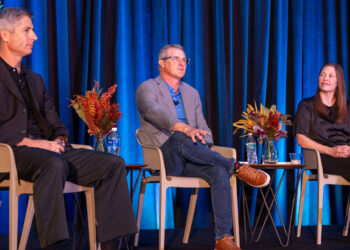A handful of municipalities have reinstated curbside recycling programs that were suspended due to the coronavirus. Still, dozens of others that curtailed service remain shut down.
On Monday, curbside programs were reinstated in Centre County, Pa.; Dalton, Ga.; Jefferson City, Mo.; New Kensington, Pa.; and Wilmington, Ohio. Service is slated to resume in Forest City, Iowa next week.
Similar program restarts took place in recent weeks in Brockville, Ontario; Emmet County, Mich.; Fairhope, Ala.; Fort Smith, Ark.; Fulshear, Texas; and Somerset, N.J.
Some programs began suspending curbside collection service in mid-March, alongside the proliferation of stay-at-home orders and other sweeping changes to daily life around the country tied to the coronavirus pandemic.
Officials cited safety concerns, staffing shortages, the need to reallocate resources and other reasons for making program changes.
Several weeks later, in some cases city officials are pointing to the growing knowledge of how coronavirus spreads as influencing their decision to restart programs. The city of Wilmington cited guidance from the Occupational Safety and Health Administration (OSHA) as influencing its initial decision to suspend curbside collection.
“As the understanding of the virus evolved, OSHA recently released new guidance for sanitation workers, lowering the risk of contact exposure for recyclables, as well as yard waste bags and brush,” the city stated in a release last week.
Elsewhere, short-term workforce shortages eased, allowing collection to continue. In Fulshear, a WCA Waste Corporation driver had tested positive for COVID-19 in early April, spurring quarantine for many other employees serving the city’s curbside program. That temporary staffing shortage had eased by April 22, allowing the program to begin again.
Numerous programs remain suspended
But as some cities resume collection, many of the programs that suspended curbside programs remain shut down.
Resource Recycling has compiled the following list of curbside program suspensions, both ongoing and those that have restarted. These include cases in which a program stops collecting from recycling carts altogether, as well as changes in which collected recyclables are commingled with garbage and sent to disposal.
The ongoing suspensions range from small, rural programs to urban municipalities such as Mesa, Ariz., population 509,000; Birmingham, Ala., population 208,000; Savannah, Ga., population 146,000; and Tuscaloosa, Ala., population 101,000.
Location (Date suspended)
- Athens, Ala. (3/14)
- Dalton, Ga. (3/16) – has since restarted
- Forest City, Iowa (3/16) – restarting May 6
- Franklin, Tenn. (3/16)
- Greater Greenville Sanitation, S.C. (3/17)
- Scottsbluff, Neb. (3/17)
- Somerset County, N.J. (3/18) – has since restarted
- Mower County, Minn. (3/18)
- Richmond, Ky. (3/19)
- Jefferson Parish, La. (3/20)
- Kandiyohi County, Minn. (3/20)
- Starkville, Miss. (3/20)
- Temple, Texas (3/20)
- Clinton County, Pa. (3/21)
- Guam Solid Waste Authority, Guam (3/21)
- New Kensington, Pa. (3/23) – has since restarted
- Fort Smith, Ark. (3/23) – has since restarted
- Emmet County, Mich. (3/23) – has since restarted
- Fayetteville, Ark. (3/23)
- Conway, Ark. (3/23)
- Jefferson City, Mo. (3/23) – has since restarted
- Mesquite, Texas (3/23)
- Tomah, Wis. (3/23)
- Wicomico County, Md. (3/23)
- York County, S.C. (3/23)
- Sedalia, Mo. (3/24)
- Glen Rock, N.J. (3/25)
- Saginaw, Mich. (3/25)
- Valley Stream, N.Y. (3/26)
- Columbus, Ga. (3/27)
- Centre County, Pa. (3/30) – has since restarted
- Big Rapids, Mich. (3/30)
- Lincoln Park, Mich. (3/30)
- Troy, Ala. (3/30)
- Foley, Ala. (3/31)
- Warren County, Ky. (3/31)
- Tonawanda, N.Y. (late March) – has since restarted
- Mesa, Ariz. (4/1)
- Tuscaloosa, Ala. (4/2)
- Valdosta, Ga. (4/3)
- Fulshear, Texas (4/3) – has since restarted
- Northport, Ala. (4/3)
- Mahoning County, Ohio (4/6)
- Hempstead, N.Y. (4/6)
- Savannah, Ga. (4/6)
- Vermillion, S.D. (4/6)
- Marshall, Mo. (4/7)
- Fairhope, Ala. (4/8) – has since restarted
- Birmingham, Ala. (4/8)
- Danville, Ky. (4/9)
- Elberton, Ga. (4/9)
- Long Beach, N.Y. (4/9)
- Richardson, Texas (4/9)
- Berea, Ky. (4/13)
- Lexington, Ky. (4/13)
- Hope Mills, N.C. (4/13)
- Tullahoma, Tenn. (4/13)
- Gary, Ind. (4/15)
- Picayune, Miss. (4/18)
- East Peoria, Ill. (5/1)
- Oxford, Miss. (5/1)
Additionally, numerous recycling programs in California are experiencing disruptions, particularly after Waste Management paused operations at MRFs throughout the state.
In a statement, the company told Resource Recycling that “regular curbside collection of waste and recycling continues throughout California.”
Much of that material, however, is not being processed as recyclables but is instead going to disposal.
City officials in Newport Beach, Calif. last month discussed the change when asked by a resident why recyclables and garbage were being collected and commingled.
During a City Council meeting, Mayor Will O’Neill said the city in mid-March received letters from Waste Management and other local haulers explaining they would suspend all processing of recyclables, close recycling facilities and send all collected materials to landfill for disposal.
“Nothing is being currently recycled,” Public Works Director Dave Webb added, noting that the recycling sector in California is now facing double hurdles of the virus impact and a loss of recycling markets. California, like other states, was hit hard by overseas import restrictions limiting markets for recyclables.
Waste Management is working to get operations restarted in the state.
“We continue to process commercial recycling in many areas of California and have also begun limited residential recycling processing,” company spokesperson Janette Micelli stated. “Our teams are working on our plans to continue to process more residential recyclables throughout the state.”
“We continue operations at our 98 other recycling processing facilities across the enterprise,” Micelli added.
If you know of other municipal recycling programs that have suspended service because of the pandemic, email a link with further information to [email protected].
This article has been updeated with additional program status information.































